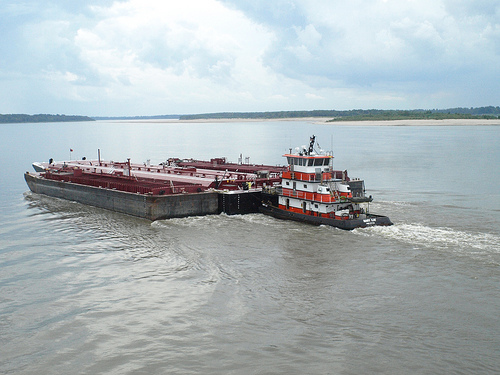Podcast: Play in new window | Download
Subscribe: RSS

It’s not easy being a Mississippi barge; 14 months ago they were being swept away by flood waters, now they’re running aground in low water. (Photo by Brad Jones/Flickr)
The Mississippi River is in some places running 53 feet below its level of last May. That’s not quite as alarming as it sounds because last May it was in an historic flood. But with little snow last winter in the mountains and no rain to speak of this year in the West and much of the Midwest, the lower river has fallen eight to 10 feet below normal. That is perilously close to shutting down one of the country’s principal arteries of commerce.
Industrial agriculture in the Midwest cannot operate without the fuel and fertilizer barged upriver, and cannot export its crops unless the barges are there to take them downriver. Many other industries and commodities — petroleum, coal, steel, sand, ore, coffee — require river barges to connect producer with consumer. Now the barges are starting to run aground. Normally loaded to 12 feet of draft, they are now restricted to nine feet, and still they’re needing rescue from sandbars here and there.
Ingram Barge, the largest operator on the river, says its freight volume has been cut by 40 per cent because they have to run their barges lighter to reduce draft and in smaller rafts. Ceres Barge Line normally runs 220 barges, but right now 150 of them are docked. The good news is that the severe drought in the heartland means there is now, and will be this fall, far less corn, soybeans and grain coming off the fields to go downriver. No, wait, that’s the bad news.
The other bad news is that everything is going to cost more to ship by river while these conditions persist. And that’s the good news compared to what will happen if the river drops much farther and barge traffic has to stop. And the other bad news: no significant rain is forecast for the watershed in the foreseeable future.
Oh, and the other bad news; the weak flow of the river is allowing salt water to push inland, and it is now threatening the drinking water intakes of the city of New Orleans. What’s the good news, you ask? There isn’t any.
One more upward shove to the price of food, globally. A few more tons of strain on the American economy. More harbingers of the hot, dry world tomorrow.